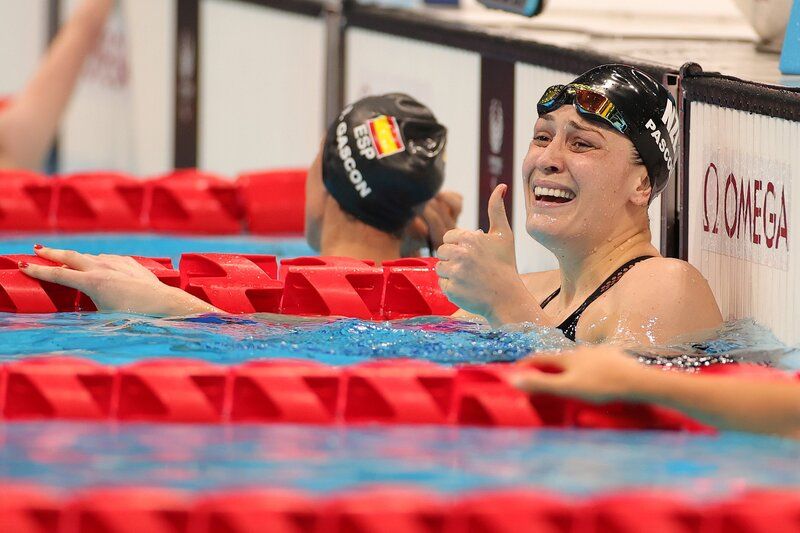Olympics Thread
-
I am an evil horrible person who will burn in hell
But I just watched the dudes do no arm backstroke and it made me laugh out loud. Wiggle racing.
-
@mariner4life said in Olympics Thread:
I am an evil horrible person who will burn in hell
But I just watched the dudes do no arm backstroke and it made me laugh out loud. Wiggle racing.
LOL. Agreed on both counts.
-
@bovidae said in Olympics Thread:
Sophie Pascoe just does enough to win gold in the 200 m IM. That's 4 in a row in this event.

The impression we have is that she's had a trying year to say the least, with a far from ideal buildup. Nice to get some rewards now
-
@canefan Yes, the emotion after winning last night was telling. Hopefully she has one more big race in her for the butterfly.
I didn't see the race but Nikita Howarth finished 4th in her 100m breaststroke final swimming with a fractured arm.
Danielle Aitchison backs up her silver in the 200 m with a bronze in the 100 m.
-
@bovidae said in Olympics Thread:
@canefan Yes, the emotion after winning last night was telling. Hopefully she has one more big race in her for the butterfly.
I didn't see the race but Nikita Howarth finished 4th in her 100m breaststroke final swimming with a fractured arm.
Danielle Aitchison backs up her silver in the 200 m with a bronze in the 100 m.
Ah, missed the last sentence.

-
Don't breathe in the final stretch, have a chunder, pass out. Grab the gold. What a legend.
-
-
Some background about the struggles Sophie Pascoe had faced preparing for Tokyo from her coach.
-
@bovidae said in Olympics Thread:
Some background about the struggles Sophie Pascoe had faced preparing for Tokyo from her coach.
For someone who sets such high standards for herself, that was added stress onto an already poor buildup
-
@canefan said in Olympics Thread:
There will be some tough talking in the wake of this. It is bloody hard though; I recently had someone in a close social group commit suicide. The family knew of the person's struggles but we were all oblivious. In hindsight there were signs. But they are very good at hiding it, and often don't want anyone to know what they are going through. Top level sport is a strain at the best of times, it must be monumental if you are carrying something like mental illness with you
I think this the best thread to put this in for now. A lengthy in-depth read on What happened to Olivia Podmore? Deceit, despair and the death of an Olympian was published in the NZ Herald today - it's worth reading if you have a subscription or a paper copy nearby.
Some key people in Cycling NZ - and Cycling NZ on the whole - come out of it looking pretty bad. Though overall there was an accumulation of things building up on first read. Notably, especially given the discussion around this in other sports too - concussion from a crash in Rio. Quoting only one section of the article:
... Almost four years on from it, Podmore was well aware it was more than just a little spill.
"After that came the delayed concussion, which was a lot," she says in her May 2020 interview.
"So I was vomiting for two days straight and felt terrible for about a good month to maybe … I honestly want to say I had symptoms for six months after that. I just wasn't myself. So, yeah, it was a pretty traumatic time looking back on the whole experience but it's made me who I am today."
Friends McLean and Murray have only looked back on that Rio crash with any suspicion since Podmore's death.
Straining their memory for moments of dejection amid the good-humour, half-formed theories arise. But this one's stuck for both of them.
It stemmed out of concerns Podmore repeatedly expressed over her inability to concentrate.
"She turned round to me one time and said 'look, I think I've got ADHD'," McLean says.
"I said 'what makes you think that', and she went through some symptoms. Dr Google, no good. But I said 'look Liv all these things could be the result of a long-term head injury'. She was out cold in Rio. It's a ripper of a crash.
"But she was on her bike the next day and like, that doesn't happen in rugby - for like the past 20 years, you can't do that. So part of it I think, could possibly have been a long-term head injury. She's like 'I'm not depressed but there's something not right, because I don't feel depressed'.
"I sort of think about, f***, was there something there? I don't think it was her only crash. She said 'oh that's not the only time I've been knocked out on my bike' and I thought 'wow'."
Murray is equally compelled by the silent erosion that Rio concussion may have had on Podmore's state of mind over the years."We never really even put two and two together," Murray says.
"Obviously, after a tragedy you're always searching for answers and the what ifs. She was seriously knocked out in Rio and then back to it like tomorrow. What does that do to a young brain and what does that do going forward? But she quite often would be like 'I'm just so dyslexic'. And we were like are you actually dyslexic? 'I don't think so, but I just sometimes confuse myself and I just say the wrong things, or I write the wrong thing down'. So maybe there was something there. Maybe there were long-term issues that we don't know about.
"We're never going to know, but it terms of the whole equation, this big jigsaw puzzle, that's another piece to actually seriously consider about the why?"
There is a growing body of research around repeated head injuries to athletes leading to a condition called Chronic Traumatic Encephalopathy (CTE), and inconclusive theories it has a connection to athlete suicide.
Neurologist and expert in traumatic brain injury at the Auckland Medical Specialists clinic, Dr Kiri Brickell, says she does not think Podmore would have had CTE. But the further disruptive impact of that Rio concussion at a highly stressful period would have been real.
"No I would expect recovery [from Podmore's Rio concussion], but the psychological … It's the other factors which prolong concussion symptoms," Brickell says.
"It's the chronic pain, which can be transformed from an episodic headache to chronic daily headache by the use of drugs. It's the sleep disruption. It's the depression and anxiety that can develop. The cognitive effects of a concussion can reduce the resilience to be able to respond to the ongoing stresses in your life."
Brickell says predicting the severity of concussion needs to be viewed in the "holistic context" of that person's life circumstances.

